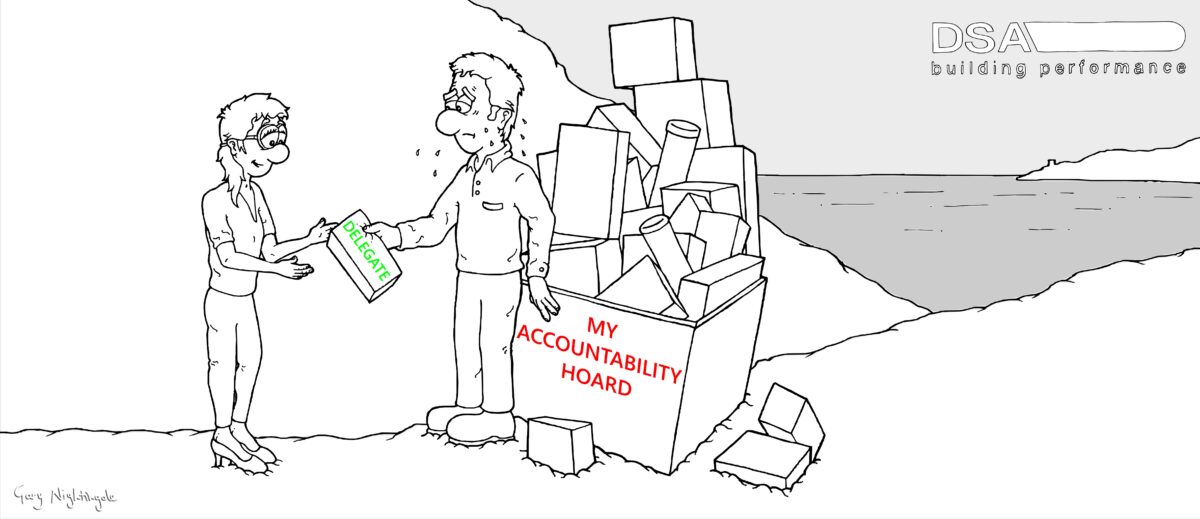How to get great things happening

Sometimes I struggle to encapsulate what I was trying to achieve with my book, “Deep and Deliberate Delegation”.
But that’s okay, because people seem to get it.
It’s still selling steadily after two years – 33 copies last month – with zero marketing on my part, except for the occasional mention on here.
And people like it. So far it has 22 reviews, all of them five-star.
It’s also on the recommended reading list for Hult Ashridge business school’s “Performance Through People” programme, along with such classics as “Drive”, by Daniel Pink. When I saw that, I was like, wow!
It’s self published, and when I wondered aloud whether I should seek a “proper” publishing deal, the response was, “Why? It’s already selling better than most commercially published books.”
Asking too little of each other
One key to what I was trying to achieve is contained in the title phrase “deep and deliberate”.
I needed a way to convey the idea that our default way of thinking about delegation – i.e., as one-off, “can-you-do-this-for-me” requests or transactions – is not adequate in our splintered organisational world.
It puts too much pressure on relationships that are shallow, or have become routinised by inertia, or are transient.
We don’t ask much from relationships that are shallow, routine or transient. And if leaders are not asking much from their relationships, how can big, necessary things get done?
Enlisting help from strangers
So, deep and deliberate delegation is a technique, made up of quite simple tools that anyone can use, which you can practice to enlist the hearts and heads of the strangers around you to achieve out-of-the-ordinary results.
I’m talking about results we can’t achieve on our own, and that need to happen soon, certainly before some big, unwieldy, top-down initiative can be launched from the boardroom.
The “deep” bit means that it’s more than a casual, one-off transaction. Instead, it’s a mutual engagement with a clear purpose and defined roles for both of you. It has a beginning, a middle, and an end.
The “deliberate” bit means that it’s a technique that you practice and get better at, as opposed to merely expressing a wish or requesting an action.
The technique contains things to do, things to say, and things to watch out for. It’s a process that you guide toward the desired outcome.
Winning back time
Another key is in the book’s subtitle: “A new art for unleashing talent and winning back time”.
I wrote it for leaders who are too busy fighting fires and meddling in other people’s work to do what they sense they should be doing.
It’s the most common complaint among the executives I coach. They often express it as not having enough “headspace”.
They know what they should be doing: looking up to the horizon to spot opportunities and risks and, in response, adjusting the organisation’s course.
These are talented, conscientious people, and that is part of the problem. The burden of their accountabilities drives them to meddle in everything.
Sometimes they fall into the trap of substituting leadership with “busyness”, because busyness is a kind of comfort zone, and looking up to the horizon is scary.
Sometimes, also, they don’t quite believe that the people around them are as capable as they themselves are, or care as much as they do. So, they hoard accountability.
But the problem with hoarding accountability is that you can’t actually do everything, and trying to do everything ultimately gets in the way of fulfilling your accountabilities.
Time to think about other things
That’s why, in the book, I urge leaders first to take a step back and think afresh about their accountabilities. What are they?
Then I encourage them to think about what sort of medium-term, out-of-the-ordinary outcomes* would really help in the ongoing fulfillment of those accountabilities.
Next, I ask them to pick one of those desired outcomes and entrust it to someone else. I mean fully entrust. Put them in the driver’s seat, and get out of the car.
The tools in the book help you establish the correct distance between you and the entrusted person, and to maintain productive communication between the two of you.
You are now supporter and adviser, not doer. It means you’ve won back time to think about other things.
New, distributed capability
Look at what has happened. One part of the burden of your accountabilities has been extracted out of the stressy tangle and expressed as a good outcome, with somebody – not you – responsible for making it happen.
That person, supported and empowered, is now on course to achieve something possibly career-defining. They will grow in confidence and capability.
The process can be repeated and repeated so that what used to be the lonely burden of your accountabilities is turning into new, distributed capability that is harnessed to fulfilling those accountabilities.
In other words, great things are happening even if it’s not you doing them.
* By out-of-the-ordinary outcomes, I don’t mean headline goals such as contract deadlines or revenue targets. Everybody knows about those already. The organisation, on the face of it, is structured to achieving them, and everybody is busy doing their stuff to meet them. What I mean are innovative responses to problems or opportunities that threaten those headline goals. An example might be a diplomatic push with a client that averts litigation.

